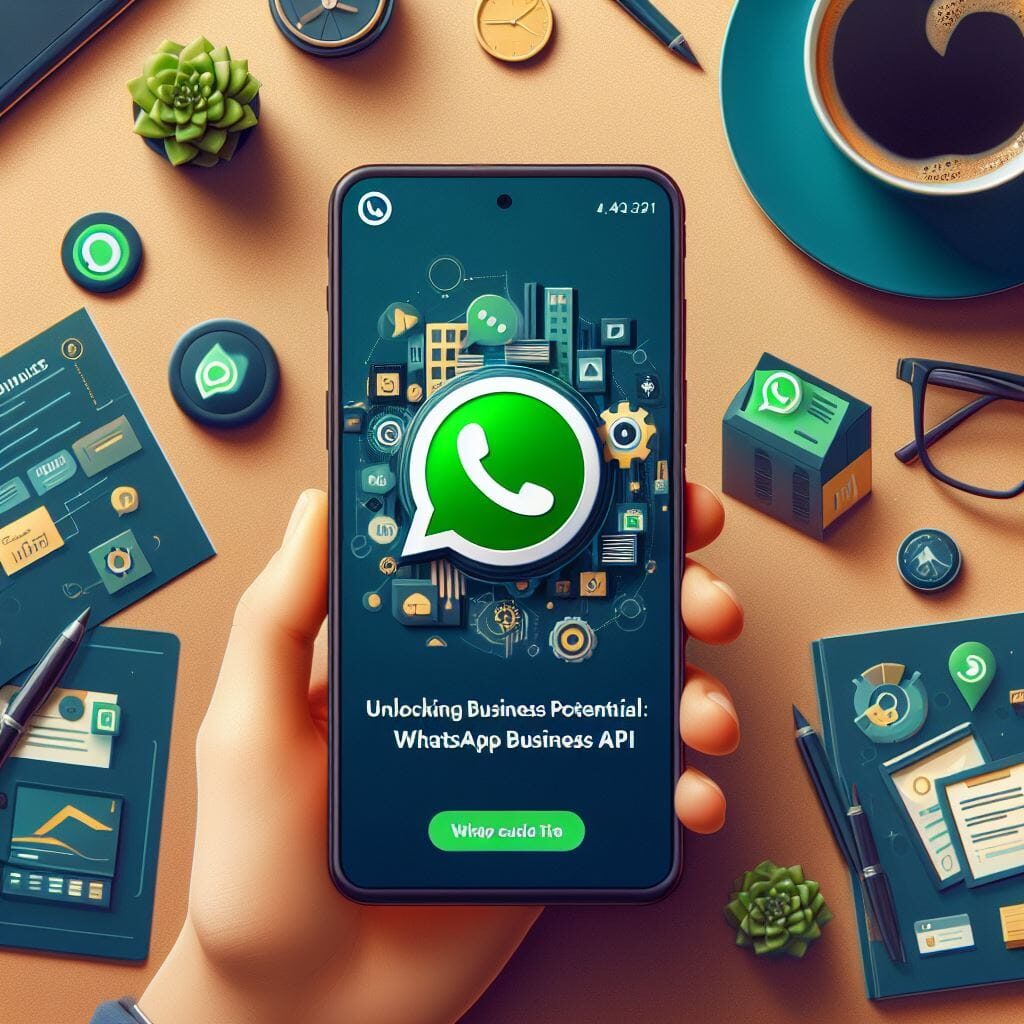How to Use WhatsApp Business API for Your Business
In this article, we will explore what WhatsApp Business API is, how it differs from WhatsApp Business App, what are its key features and benefits, and how you can implement it for your business.
WhatsApp is one of the most popular and widely used messaging apps in the world, with over 2 billion users across 180 countries. It is not only a convenient and secure way to communicate with friends and family, but also a powerful tool for businesses to connect with their customers and prospects.
Understanding WhatsApp Business API
It is a solution that allows businesses to integrate WhatsApp into their existing systems and platforms, such as CRM, ERP, or web applications. It enables businesses to send and receive messages, notifications, and media files to and from their customers via WhatsApp.
It was launched in 2018, as an extension of WhatsApp Business App, which is a separate app designed for small and medium-sized businesses. WhatsApp Business App allows businesses to create a profile, display their products and services, and interact with their customers through WhatsApp. Nevertheless, it exhibits certain constraints, including:
Usage is restricted to a single device at any given moment.
It can only handle up to 256 chats at a time.
It does not support automation or integration with other systems.
It overcomes these limitations and offers more features and flexibility for businesses, especially for large and enterprise-scale businesses. However, to access WhatsApp Business API, businesses need to meet certain eligibility criteria and go through an application process, which involves:
Verifying their business identity and phone number.
Choosing a WhatsApp Business API provider, which is a third-party service that helps businesses set up and manage their WhatsApp Business API account.
Creating and submitting message templates, which are pre-approved messages that businesses can use to initiate conversations with customers or send notifications.
Complying with WhatsApp’s policies and guidelines, such as respecting user privacy, obtaining user consent, and avoiding spam.
Key Features of WhatsApp Business API

It offers a range of features that can help businesses enhance their communication and engagement with their customers. Some of the key features are:
Two-way messaging:
It allows businesses to send and receive messages to and from their customers, either manually or automatically. Businesses can use two types of messages: session messages and template messages. Session messages are free and can be used to reply to customer queries or requests within a 24-hour window. Template messages are paid and can be used to initiate conversations or send notifications outside the 24-hour window.
Rich media support:
It supports sending and receiving various types of media files, such as images, videos, documents, audio, and location. Businesses can use these media files to enhance their messages and provide more information or value to their customers. For example, businesses can send product images, video tutorials, invoices, receipts, or maps to their customers via WhatsApp.
Automated messaging:
It enables businesses to automate their communication and streamline their workflows through automated responses and chatbots. Businesses can use automated responses to provide instant answers to common questions, confirm orders, send reminders, or collect feedback. Businesses can also use chatbots to provide more interactive and personalized experiences to their customers, such as booking appointments, placing orders, or offering recommendations.
Template Messages:
It requires businesses to use template messages for initiating conversations or sending notifications to their customers. Template messages are pre-approved messages that businesses can create and submit to WhatsApp for approval. Template messages ensure that businesses comply with WhatsApp’s policies and guidelines and maintain consistency and quality in their communication. Template messages can also support variables, which allow businesses to customize their messages with specific information, such as names, dates, or prices.
Benefits for Businesses
It can provide various benefits for businesses, such as:
Enhanced customer engagement: WhatsApp Business API can help businesses improve their customer engagement by enabling real-time, personalized, and convenient interactions with their customers. Businesses can use WhatsApp to communicate with their customers in a familiar and friendly way, and provide them with relevant and timely information, support, and solutions. Businesses can also use WhatsApp to build rapport and loyalty with their customers, and encourage them to take action or make a purchase.
Global reach:
It can help businesses expand their reach and access a vast and diverse user base across the world. WhatsApp is available in over 180 countries and supports over 60 languages, which means that businesses can use WhatsApp to connect with their customers in their preferred language and region. Businesses can also use WhatsApp to tap into new markets and opportunities, and increase their brand awareness and visibility.
Building trust:
It can help businesses build trust and credibility with their customers by utilizing the trusted platform of WhatsApp for their business communication. WhatsApp is known for its security and privacy features, such as end-to-end encryption, which ensure that the messages and media files exchanged between businesses and customers are safe and secure. Businesses can also use WhatsApp to verify their identity and display their profile, which can help customers recognize and trust them.
Improved efficiency:
WhatsApp Business API can help businesses improve their efficiency and productivity by automating and integrating their communication and processes. Businesses can use WhatsApp to automate their routine tasks and provide quick and consistent responses to their customers, which can save time and resources. Businesses can also use WhatsApp to integrate their communication with their existing systems and platforms, such as CRM, ERP, or web applications, which can streamline their workflows and data management.
Implementing WhatsApp Business API
To implement WhatsApp Business API for your business, you need to consider the following aspects:
Technical requirements:
To integrate WhatsApp Business API with your existing systems and platforms, you need to have some technical knowledge and skills, such as programming, web development, and API management. You also need to have the necessary infrastructure and resources, such as servers, databases, and network connections, to support the API integration and operation.
Choosing the right provider:
To access WhatsApp Business API, you need to choose a WhatsApp Business API provider, which is a third-party service that helps you set up and manage your WhatsApp Business API account. There are many WhatsApp Business API providers available in the market, each offering different features, pricing, and support. You need to compare and evaluate the providers based on your business needs and goals, and select the one that suits you best.
Implementation challenges and solutions:
Implementing WhatsApp Business API can pose some challenges for your business, such as:
Compliance:
You need to comply with WhatsApp’s policies and guidelines, such as respecting user privacy, obtaining user consent, and avoiding spam. You also need to comply with the local laws and regulations of the countries and regions where you operate and serve your customers.
Approval:
You need to apply for and obtain approval from WhatsApp for accessing the API, verifying your business identity and phone number, and creating and submitting message templates. The approval process can take some time and effort, and you need to ensure that your application and templates meet WhatsApp’s standards and expectations.
Cost:
You need to pay for using WhatsApp Business API, either per message or per user, depending on your provider and plan. You also need to pay for the infrastructure and resources required for the API integration and operation. You need to calculate and manage your budget and expenses, and optimize your return on investment.
To overcome these challenges, you need to plan and prepare well, and seek guidance and support from your provider and other experts.
Compliance and Security :
WhatsApp Business API requires businesses to comply with WhatsApp’s policies and guidelines for API usage, which are designed to protect the interests and rights of both businesses and users. Some of the key policies and guidelines are:
User consent:
Businesses must obtain explicit and verifiable consent from users before sending them any messages or notifications via WhatsApp. Businesses must also respect the users’ preferences and choices, such as opting out or blocking the communication.
Message quality:
Businesses must ensure that their messages are relevant, appropriate, and useful for the users. Businesses must also avoid sending spam, promotional, or unsolicited messages that might annoy or harm the users.
Data privacy and security:
Businesses must adhere to the data privacy and security laws and regulations of the countries and regions where they operate and serve their customers. Businesses must also protect the personal and sensitive data of their customers and users, and not share or misuse it without their permission.
WhatsApp Business API also ensures data privacy and security in business communications by using end-to-end encryption, which means that the messages and media files exchanged between businesses and users are encrypted and decrypted only by the sender and the receiver, and not by WhatsApp or any third-party. This prevents any unauthorized access or interception of the communication.
Future Trends and Developments :
WhatsApp Business API is constantly evolving and improving to meet the changing needs and expectations of businesses and users. Some of the predictions for the future of WhatsApp Business API are:
More Features and Functionalities :
WhatsApp Business API might introduce more features and functionalities to enhance the communication and engagement between businesses and users, such as voice and video calls, stickers and emojis, QR codes and links, and more.
More Integration and Automation :
WhatsApp Business API might enable more integration and automation of business communication and processes with other systems and platforms, such as social media, e-commerce, payment, and more.
More Innovation and Creativity :
WhatsApp Business API might inspire more innovation and creativity in business communication and strategies, such as using artificial intelligence, machine learning, natural language processing, and more.
Use Cases and Success Stories
WhatsApp Business API has been used by various businesses across different industries and sectors for different purposes and goals. Examples of successful applications and notable achievements include:
Customer Support :
It can help businesses provide efficient and effective customer support by enabling quick and easy communication, resolving issues and queries, providing information and guidance, and collecting feedback and ratings. For example, KLM Royal Dutch Airlines uses WhatsApp Business API to provide flight information, boarding passes, check-in reminders, and customer service to its passengers.
Transactional Communication :
It can help businesses facilitate transactional communication by sending order confirmations, delivery updates, payment reminders, invoices, receipts, and more. For example, BookMyShow, an online ticketing platform, uses WhatsApp Business API to send tickets, seat numbers, show timings, and offers to its customers.
Marketing Campaigns :
It can help businesses implement marketing campaigns by sending personalized and targeted messages, notifications, and media files to their customers and prospects, and encouraging them to take action or make a purchase. For example, Netflix, a streaming service, uses WhatsApp Business API to send movie and show recommendations, trailers, and reviews to its subscribers.
It is a powerful and versatile solution that can help you leverage the popularity and potential of WhatsApp for your business communication and engagement. It can help you enhance your customer experience, expand your global reach, build your trust and credibility, and improve your efficiency and productivity. However, to implement WhatsApp Business API successfully, you need to understand its features and benefits, meet its technical and compliance requirements, choose the right provider, and overcome the implementation challenges. If you are interested in using WhatsApp Business API for your business, you can contact us for more information and assistance. We are a leading WhatsApp Business API provider, and we can help you set up and manage your WhatsApp Business API account, and integrate it with your existing systems and platforms. We can also help you create and submit message templates, automate and personalize your communication, and optimize your performance and results. We look forward to hearing from you and helping you use WhatsApp Business API for your business.




